- Clone
- Eat-2 (See other available formats)
- Regulatory Status
- RUO
- Other Names
- TAPA-1
- Isotype
- Armenian Hamster IgG1, κ
- Ave. Rating
- Submit a Review
- Product Citations
- publications
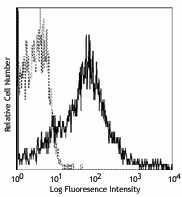
-

C57BL/6 mouse splenocytes stained with Eat-2 PE -

C57BL/6 mouse splenocytes stained with Eat-2 PE
| Cat # | Size | Price | Save |
|---|---|---|---|
| 104905 | 50 µg | ¥28,380 | |
| 104906 | 200 µg | ¥77,660 |
CD81 is a 26 kD non-glycosylated member of the tetraspanin superfamily (TM4SF), also known as TAPA-1. CD81 is expressed on T and B cells, NK cells, dendritic cells, thymocytes, endothelial cells, and fibroblasts. CD81 induces B cell adhesion via the VLA-4 integrin and has been shown to play a role in early T cell development. CD81 associates with several other cell-surface proteins in a multimolecular complex, including CD19, CD21, CD20, CD37, CD53, and CD82 in B cells, and CD4, CD8 and CD82 in T cells.
Product DetailsProduct Details
- Verified Reactivity
- Mouse, Rat
- Antibody Type
- Monoclonal
- Host Species
- Armenian Hamster
- Immunogen
- CD81+ mouse B lymphoma 38C13
- Formulation
- Phosphate-buffered solution, pH 7.2, containing 0.09% sodium azide.
- Preparation
- The antibody was purified by affinity chromatography, and conjugated with PE under optimal conditions.
- Concentration
- 0.2 mg/ml
- Storage & Handling
- The antibody solution should be stored undiluted between 2°C and 8°C, and protected from prolonged exposure to light. Do not freeze.
- Application
-
FC - Quality tested
- Recommended Usage
-
Each lot of this antibody is quality control tested by immunofluorescent staining with flow cytometric analysis. For flow cytometric staining, the suggested use of this reagent is ≤ 0.25 µg per 106 cells in 100 µl volume. It is recommended that the reagent be titrated for optimal performance for each application.
- Excitation Laser
-
Blue Laser (488 nm)
Green Laser (532 nm)/Yellow-Green Laser (561 nm)
- Application Notes
-
The Eat-2 antibody reacts with mouse and rat CD81. Additional reported applications (for the relevant formats) include: immunoprecipitation1,2, Western blotting1,2, induction of homotypic adhesion of B lymphocytes1, stimulation of B cells undergo early apoptotic events1, and promotion of T cell motility2.
-
Application References
(PubMed link indicates BioLegend citation) -
1. Maecker HT, et al. 2000. Hybridoma 19:15. (IP, WB, Stim)
2. Clark KL, et al. 2001. J. Immunol. 167:5115. (IP, WB, Activ)
3. Bhatnagar S and Schorey JS. 2007. J. Biol. Chem. doi:10.1074/jbc.M702277200. PubMed
4. Castro-Seoane R, et al. 2012. PLoS Pathog. 8:1002538. PubMed - Product Citations
-
- RRID
-
AB_2076266 (BioLegend Cat. No. 104905)
AB_2076266 (BioLegend Cat. No. 104906)
Antigen Details
- Structure
- TM4SF tetraspanin, 26 kD
- Distribution
-
T cells and B cells, NK cells, dendritic cells, thymocytes, endothelial cells, fibroblasts
- Function
- Regulates cell growth
- Cell Type
- B cells, Dendritic cells, Endothelial cells, Fibroblasts, NK cells, T cells, Thymocytes
- Biology Area
- Immunology
- Molecular Family
- Adhesion Molecules, CD Molecules
- Antigen References
-
1. Barclay AN, et al. 1997. The Leukocyte Antigen FactsBook Academic Press.
2. Levy S, et al. 1998. Annu. Rev. Immunol. 16:89.
3. Maeker HT, et al. 1997. FASEB J. 11:428.
4. Boismenu R, et al. 1996. Science. 271:198. - Gene ID
- 12520 View all products for this Gene ID 25621 View all products for this Gene ID
- UniProt
- View information about CD81 on UniProt.org
Related Pages & Pathways
Pages
Related FAQs
- What type of PE do you use in your conjugates?
- We use R-PE in our conjugates.
Other Formats
View All CD81 Reagents Request Custom Conjugation| Description | Clone | Applications |
|---|---|---|
| Biotin anti-mouse/rat CD81 | Eat-2 | FC |
| PE anti-mouse/rat CD81 | Eat-2 | FC |
| Purified anti-mouse/rat CD81 | Eat-2 | FC,IP,WB |
| APC anti-mouse/rat CD81 | Eat-2 | FC |
| PerCP/Cyanine5.5 anti-mouse/rat CD81 | Eat-2 | FC |
| PE/Cyanine7 anti-mouse/rat CD81 | Eat-2 | FC |
| TotalSeq™-C1064 anti-mouse/rat CD81 Antibody | Eat-2 | PG |
| TotalSeq™-A1064 anti-mouse/rat CD81 | Eat-2 | PG |
| TotalSeq™-B1064 anti-mouse/rat CD81 | Eat-2 | PG |
Customers Also Purchased
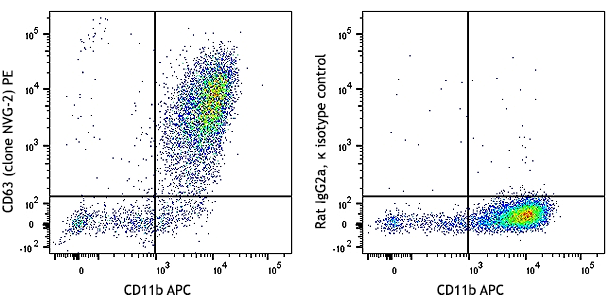
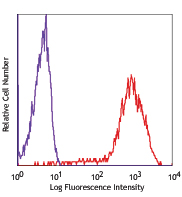


Compare Data Across All Formats
This data display is provided for general comparisons between formats.
Your actual data may vary due to variations in samples, target cells, instruments and their settings, staining conditions, and other factors.
If you need assistance with selecting the best format contact our expert technical support team.
-
Biotin anti-mouse/rat CD81
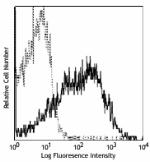
C57BL/6 mouse splenocytes stained with Eat-2 PE 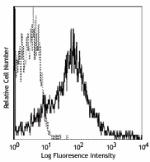
C57BL/6 mouse splenocytes stained with Eat-2 PE -
PE anti-mouse/rat CD81

C57BL/6 mouse splenocytes stained with Eat-2 PE 
C57BL/6 mouse splenocytes stained with Eat-2 PE -
Purified anti-mouse/rat CD81

C57BL/6 mouse splenocytes stained with Eat-2 PE 
C57BL/6 mouse splenocytes stained with Eat-2 PE -
APC anti-mouse/rat CD81
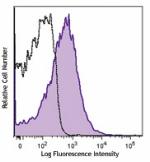
C57BL/6 mouse splenocytes were stained with mouse/rat CD81 (... -
PerCP/Cyanine5.5 anti-mouse/rat CD81
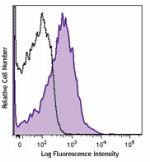
C57BL/6 mouse splenocytes were stained with mouse/rat CD81 (... -
PE/Cyanine7 anti-mouse/rat CD81
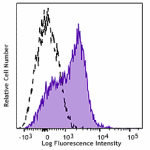
C57BL/6 mouse splenocytes were stained with mouse/rat CD81 (... -
TotalSeq™-C1064 anti-mouse/rat CD81 Antibody
-
TotalSeq™-A1064 anti-mouse/rat CD81
-
TotalSeq™-B1064 anti-mouse/rat CD81














Follow Us